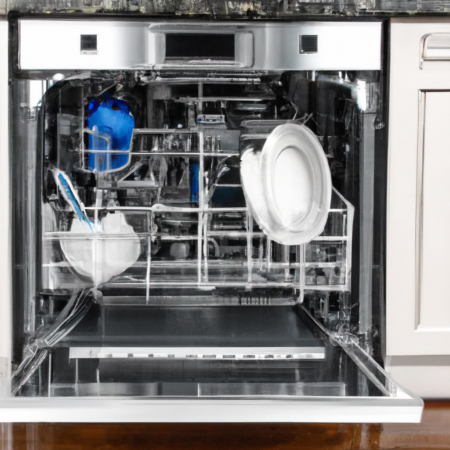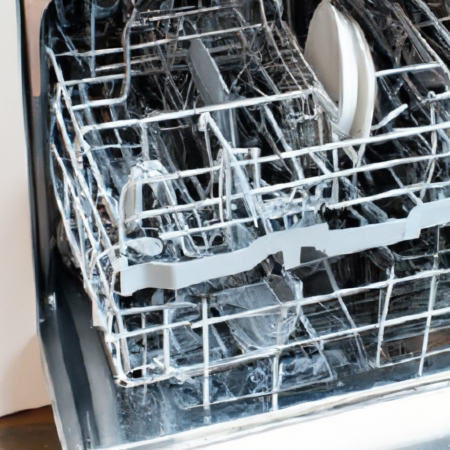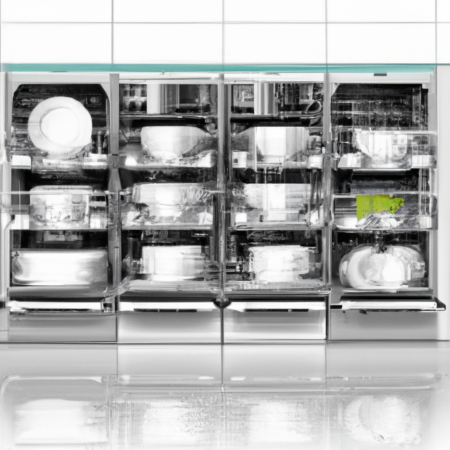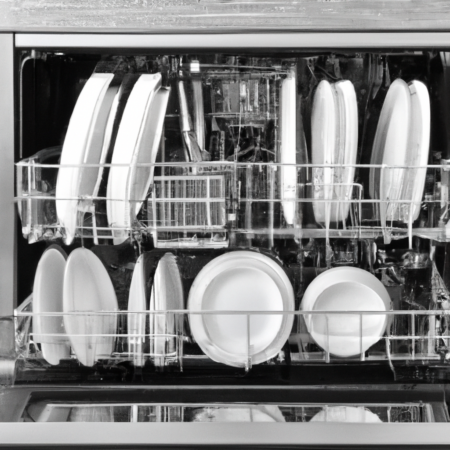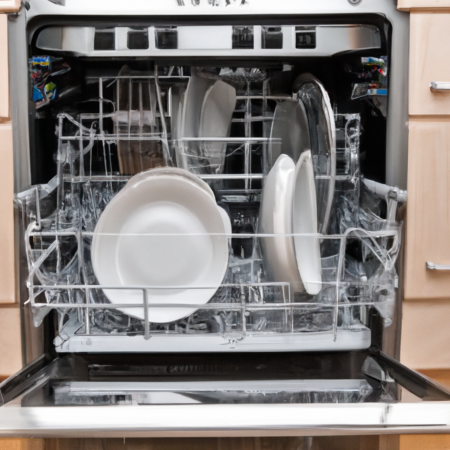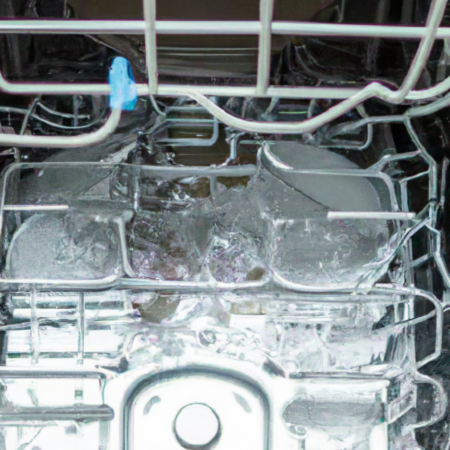We're an affiliate
We hope you love the products we recommend! Just so you know, we may collect a share of sales or other compensation from the links on this page. Thank you if you use our links, we really appreciate it!
Have you ever wondered how to remove that stubborn hard water buildup in your dishwasher? Well, worry no more because in this article, we will explore various effective methods to eliminate hard water deposits and keep your dishwasher running smoothly. Say goodbye to those annoying white spots and residue on your dishes, and get ready for sparkling clean results. With these simple tips and tricks, you’ll have your dishwasher looking and working as good as new in no time!
Understanding the Impact of Hard Water
What is hard water?
Hard water is water that contains a high concentration of minerals, such as calcium and magnesium. These minerals are commonly found in groundwater sources and can lead to various issues when it comes to household appliances, including dishwashers.
How does hard water affect dishwashers?
When hard water is used in dishwashers, the minerals within the water can accumulate and form a buildup on various surfaces, such as the interior walls of the dishwasher, the filter, and the spinning arms. This buildup can negatively impact the performance and efficiency of the dishwasher, causing dishes to come out looking spotty or not as clean as they should be.
Signs of hard water buildup in your dishwasher
There are several signs that indicate the presence of hard water buildup in your dishwasher. Some common signs include:
- Noticeable film or residue on dishes and glassware after a wash cycle.
- Spots or streaks on glassware, cutlery, and dishes.
- A cloudy appearance on glassware.
- Reduced water flow or blockages within the dishwasher’s spray arms or nozzles.
- Unpleasant odors coming from the dishwasher.
If you notice any of these signs, it’s essential to address the issue promptly to prevent further damage and maintain the efficiency of your dishwasher.
Preventing Hard Water Buildup
Using a water softener
One effective way to prevent hard water buildup in your dishwasher is by using a water softener. Water softeners work by removing the minerals present in the water, reducing the hardness. By installing a water softener in your home, you can ensure that the water used in your dishwasher is free from minerals that can cause buildup.
Regular maintenance of dishwasher
Regular maintenance of your dishwasher can also help prevent hard water buildup. This includes cleaning the dishwasher’s filter regularly, wiping down the interior walls and door seals, and ensuring that the spray arms and nozzles are free from any blockages. Regular maintenance not only helps prevent buildup but also improves the overall efficiency and lifespan of your dishwasher.
Choosing the right dishwasher detergent
Choosing the right dishwasher detergent is essential when dealing with hard water. Look for dishwasher detergents specifically formulated for hard water, as they usually contain ingredients that can help prevent mineral buildup and leave dishes looking sparkling clean. Additionally, some detergents include water softening agents, further reducing the impact of hard water on your dishwasher.
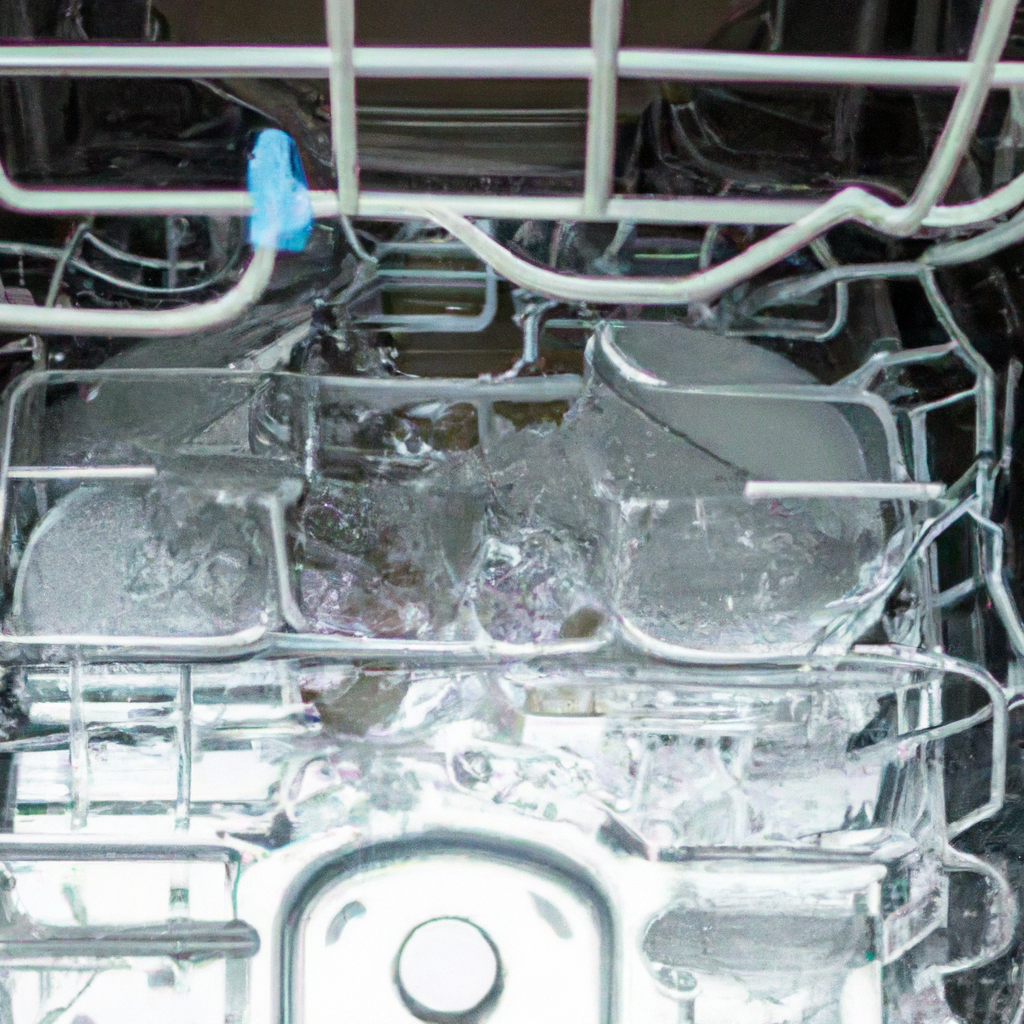
Immediate Actions for Hard Water Buildup
Assessing the level of buildup
Before taking any action, it’s important to assess the level of hard water buildup in your dishwasher. This will help you determine the most appropriate method for removal. If the buildup is minimal, you may be able to address it through simple cleaning methods. However, if the buildup is severe, you may need to take more thorough measures or seek professional help.
Emptying the dishwasher
Before attempting to remove hard water buildup, ensure that your dishwasher is empty. Remove all dishes, cutlery, and any other items from the dishwasher to provide easy access to the affected areas. This will allow you to clean the dishwasher more effectively and target the areas where the buildup is most prominent.
Disconnecting the power
For safety purposes, it is crucial to disconnect the power supply to your dishwasher before attempting any cleaning or maintenance tasks. This will minimize the risk of electrical shock and ensure a safe working environment. Refer to your dishwasher’s user manual for instructions on how to safely disconnect the power supply.
Utilizing Vinegar Solution
Preparing the vinegar solution
One effective and natural method for removing hard water buildup from your dishwasher is by using a vinegar solution. To create the solution, mix equal parts of white vinegar and water in a bowl or container. The vinegar’s acidic properties help dissolve and break down the mineral deposits in the dishwasher, making it easier to remove.
Running the dishwasher with vinegar
After preparing the vinegar solution, pour it into a dishwasher-safe container or a cup and place it on the top rack of the dishwasher. Ensure that the dishwasher is empty, and then run a hot water cycle. The heat, combined with the vinegar solution, will help break down the hard water buildup, leaving your dishwasher cleaner and more efficient.
Frequency of using vinegar solution
The frequency of using a vinegar solution to remove hard water buildup will depend on the severity of the buildup and the hardness of the water in your area. As a general guideline, using a vinegar solution once every month or two can help prevent excessive buildup. However, if you notice signs of buildup returning, you may need to increase the frequency or consider alternative methods.
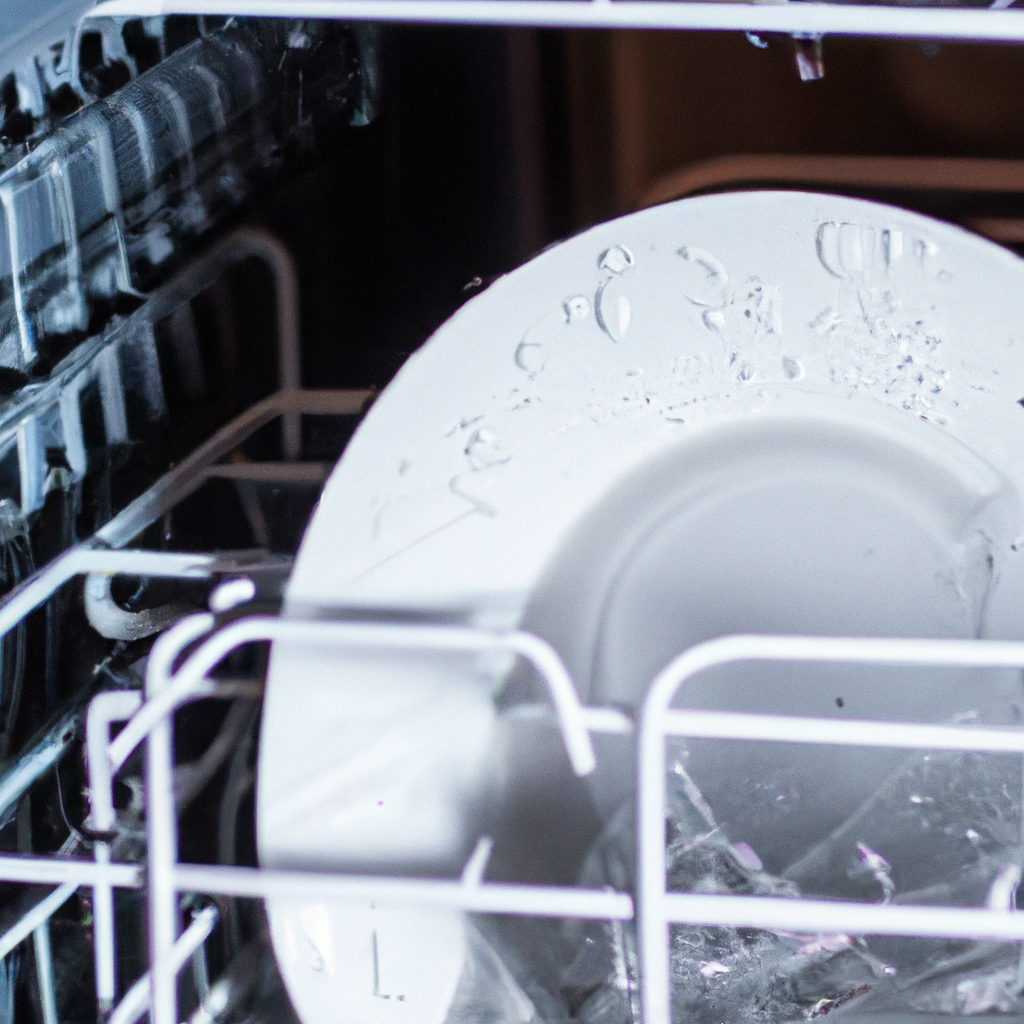
Using Commercial Dishwasher Cleaners
Choosing the right cleaner
If you prefer using commercial cleaners to remove hard water buildup, it’s important to choose the right one for your dishwasher. Look for dishwasher cleaners specifically designed to tackle hard water deposits. These cleaners often contain specialized ingredients that target mineral buildup effectively.
Using commercial cleaners safely
When using commercial cleaners, always follow the instructions provided on the product packaging. Wear protective gloves if recommended and keep the area well-ventilated. Avoid using excessive amounts of cleaner, as this may lead to residue or an unpleasant odor within the dishwasher. Be mindful of any warning labels or precautions mentioned on the cleaner.
Advantages and disadvantages of commercial cleaners
Commercial dishwasher cleaners have their advantages and disadvantages, which you should consider before making a choice. The advantages include their strong cleaning power, convenience, and specialized formulations for tackling hard water buildup. However, some commercial cleaners may contain harsh chemicals that can be harmful to the environment or cause skin irritation. Additionally, they may be more expensive compared to natural cleaning methods.
Scrubbing and Physical Removal
Suitable tools for scrubbing
In some cases, hard water buildup may require manual removal through scrubbing. To effectively scrub the affected areas, use a soft sponge or cloth to avoid scratching or damaging the dishwasher’s surfaces. Additionally, you may need a toothbrush or a small cleaning brush with soft bristles to reach difficult-to-clean areas and crevices.
Proper scrubbing techniques
When scrubbing the dishwasher, it’s essential to use gentle yet firm motions to remove hard water buildup. Apply a cleaning solution, such as a vinegar solution or dishwasher cleaner, onto the affected areas and scrub in circular or back-and-forth motions. Take your time to thoroughly clean all surfaces, including the filter, spinning arms, and nozzles, to ensure optimal results.
Precautions while scrubbing
While scrubbing your dishwasher, it’s important to take certain precautions to avoid any accidents or damage. Avoid using excessive force or using abrasive materials that can scratch or damage the surfaces. Be cautious when scrubbing near electrical components or delicate parts of the dishwasher. It’s also advisable to wear gloves to protect your hands from any cleaning products or particles.
Rinsing and Drying the Dishwasher
How to rinse your dishwasher
After removing hard water buildup or scrubbing the dishwasher, it’s crucial to thoroughly rinse it to remove any cleaning residue. Use a clean cloth or sponge and warm water to wipe down all the surfaces, including the interior walls, filters, and spinning arms. Pay close attention to ensure that no cleaning product residue remains, as this can affect dishwasher performance.
Importance of drying the dishwasher
Properly drying the dishwasher after cleaning is vital to prevent the growth of mold or mildew. Moisture left behind can provide an ideal environment for these unwanted substances to thrive. Thoroughly dry the dishwasher interior, including any hard-to-reach areas, with a dry cloth or towel before closing the door.
Effective tips for drying
To enhance the drying process, consider leaving the dishwasher door slightly open for a few hours after cleaning to promote airflow and allow any residual moisture to evaporate. If possible, utilize a fan or dehumidifier in the vicinity to hasten the drying process. Ensuring the dishwasher is completely dry before using it again will help maintain its cleanliness and efficiency.
Post-cleaning Check and Maintenance
Inspecting for any leftover buildup
After cleaning your dishwasher, it’s essential to perform a post-cleaning check to ensure that no leftover hard water buildup remains. This includes inspecting all surfaces, filters, spray arms, and nozzles for any signs of remaining residue or deposits. By thoroughly assessing the dishwasher, you can address any overlooked areas or potential issues promptly.
Running a clean cycle
Running a clean cycle on your dishwasher periodically can further prevent hard water buildup and maintain its cleanliness. Many dishwashers have a designated clean cycle option, which allows hot water and dishwasher-safe cleaning agents to circulate within the machine, removing any residual buildup or odors. Follow your dishwasher’s user manual for instructions on running a clean cycle.
Regular maintenance routine
Implementing a regular maintenance routine for your dishwasher is essential to prevent hard water buildup from recurring. This routine should include cleaning the filter, wiping down all surfaces, inspecting and cleaning the spray arms and nozzles, and running a clean cycle periodically. By incorporating these maintenance tasks into your routine, you can keep your dishwasher in optimal condition and avoid future issues with hard water buildup.
Understanding Dishwasher Components
Important dishwasher components
To effectively care for and prevent hard water buildup in your dishwasher, it’s beneficial to understand its various components. Some important dishwasher components to be aware of include the filter, spinning arms, spray nozzles, door gasket, and detergent dispenser. Each of these components plays a vital role in the dishwasher’s performance and can be susceptible to hard water buildup.
Cleaning individual components
Regularly cleaning individual dishwasher components is crucial for preventing hard water buildup and maintaining the efficiency of your dishwasher. Remove and clean the filter regularly to ensure proper water flow. Wipe down the spinning arms and nozzles, removing any mineral deposits that may have accumulated. Inspect and clean the door gasket, as buildup in this area can lead to leaks or inefficiencies. Refer to your dishwasher’s user manual for specific instructions on cleaning each component.
Caring for these components
In addition to cleaning, proper care of dishwasher components is essential for longevity and optimal performance. Avoid placing large or sharp utensils near the spinning arms to prevent any damage. Regularly check and clean the detergent dispenser to ensure it functions correctly. Gently wipe down the door gasket after each use to remove any residue or buildup. By caring for these components, you can prolong the lifespan of your dishwasher and reduce the likelihood of hard water buildup.
Professional Help for Hard Water Buildup
When to seek professional help
In some cases, hard water buildup in your dishwasher may be too severe or persistent to address through regular cleaning methods. If you have tried multiple cleaning techniques without success or if you are unsure about the proper approach, it may be time to seek professional help. Professional cleaners have the expertise and specialized equipment to effectively remove hard water buildup and restore your dishwasher’s performance.
Choosing a reliable professional cleaner
When choosing a professional cleaner for your dishwasher, it’s important to select a reliable and reputable service provider. Look for companies or individuals with experience in dealing with hard water issues and positive customer reviews. Seek recommendations from friends, family, or neighbors who have had similar problems and have been satisfied with the professional help they received.
The cost associated with professional cleaning
The cost of professional cleaning for hard water buildup in your dishwasher can vary depending on the severity of the issue, the geographical location, and the specific service provider. It’s advisable to contact multiple professionals and inquire about their pricing structure and any additional fees that may apply. Compare the quotes and consider the reputation and expertise of each provider before making a decision.
In conclusion, understanding the impact of hard water on your dishwasher and taking appropriate preventive measures can help prolong its lifespan and maintain its efficiency. Regular maintenance, the use of water softeners, and choosing the right detergent are all essential in preventing hard water buildup. In cases where buildup occurs, immediate actions such as utilizing vinegar solutions or commercial cleaners, as well as scrubbing and physical removal, can be effective. Rinsing and drying the dishwasher thoroughly, inspecting for any remaining buildup, and conducting regular post-cleaning checks and maintenance routines are crucial to ensure the dishwasher’s optimal performance. Understanding the various components of the dishwasher, cleaning them regularly, and seeking professional help when necessary can also contribute to addressing hard water buildup and keeping your dishwasher in top shape.


